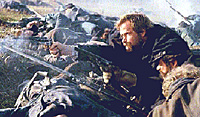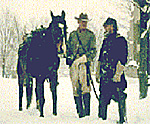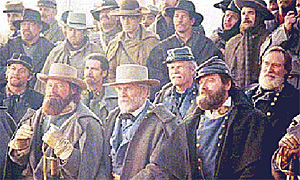 Two major motion pictures (of exceptional length) were released during this past year depicting events which occurred in and around the year 1861: Gangs of New York and
Gods and Generals. Both films had the potential of telling gripping and poignant stories — but while “Gangs…” failed to convey the true heart of the story, Gods and Generals does achieve a good measure of success.
Two major motion pictures (of exceptional length) were released during this past year depicting events which occurred in and around the year 1861: Gangs of New York and
Gods and Generals. Both films had the potential of telling gripping and poignant stories — but while “Gangs…” failed to convey the true heart of the story, Gods and Generals does achieve a good measure of success.
Gods and Generals is based on the book (of the same name) by Jeff Shaara — son of the late Michael Shaara, whose book The Killer Angels was the basis for the film Gettysburg. These books are classified as “Historical Fiction” — a somewhat misleading label. It doesn’t mean that the story is fiction (it may indeed be quite factual), but that “parts” of the story have been fictionalised to fill in such things as personal conversations and to allow certain events to be rearranged for better storytelling. It is an accepted genre; used to good effect by such eminent writers as Gore Vidal and even Barbara Tuchman.
Since the films Gods and Generals and Gettysburg are so closely related (both produced and directed by Mr. Maxwell), comparisons are inevitable. Both films are excessively lengthy, but Gettysburg marches on at an acceptable cadence, while Gods and Generals tends to plod like a troop of war-weary soldiers. I believe a full hour could be edited from this film and never missed.
 While Gettysburg focused on three days in July 1863, Gods and Generals more or less covers the initial two-and-a-half years of the Civil War. The battle events depicted are: First Bull Run (Manassas), Fredericksburg and Chancellorsville — but the primary focus of the film is on General Thomas J. “Stonewall” Jackson. General Jackson is portrayed by actor Stephen Lang — who played General Pickett in Gettysburg. That he was able to get through Jackson’s endless diatribes without the use of supplemental oxygen is amazing accomplishment. Southern Commander, the venerable Robert E. Lee, is portrayed by Robert Duvall, while Jeff Daniels reprises his role as Colonel Joshua Lawrence Chamberlain. Other
familiar faces from Gettysburg include Kevin Conway (Sgt. Buster Kilrain) and C. Thomas Howell (Lt. Thomas Chamberlain).
While Gettysburg focused on three days in July 1863, Gods and Generals more or less covers the initial two-and-a-half years of the Civil War. The battle events depicted are: First Bull Run (Manassas), Fredericksburg and Chancellorsville — but the primary focus of the film is on General Thomas J. “Stonewall” Jackson. General Jackson is portrayed by actor Stephen Lang — who played General Pickett in Gettysburg. That he was able to get through Jackson’s endless diatribes without the use of supplemental oxygen is amazing accomplishment. Southern Commander, the venerable Robert E. Lee, is portrayed by Robert Duvall, while Jeff Daniels reprises his role as Colonel Joshua Lawrence Chamberlain. Other
familiar faces from Gettysburg include Kevin Conway (Sgt. Buster Kilrain) and C. Thomas Howell (Lt. Thomas Chamberlain).
Gods and Generals does make certain points clear: the extent of disorganization (on both sides) at the onset of the war; the fact that tactics lagged far behind the technical apabilities of available weapons and the incredible ineptness of Northern commanders during the first two years of conflict. The bumbling and fumbling of Union Army commanders was not lost on the rank and file soldiers.
At one point, a small group of Confederate soldiers are sitting by a stream in the early morning. On the other side, just a dozen yards away, was a Union soldier having a wash and cup of coffee. One of the Southern soldiers yells across, “Hey Yank, got anything you want to trade?” The Union soldier yells back, “Have you got a lame horse?” The Reb replies, “What’ll you give me for it?” His blue-uniformed counterpart answers, “General Burnside.”
The battle scenes are well filmed – giving a sense of close-up presence and conveying the terror of being under such intense fire. With the black powder discharging of thousands of rifles and countless cannon, the field was quickly enveloped in a thick shroud of smoke. Visibility was limited to a hundred feet to times.
What I didn’t like was the sanitizing of the battles scenes — that is, the inexplicable lack of blood. Civil War rifles and muskets fired a solid lead shot (either round ball or conical mini-ball) of about .52 calibre. Not to put too fine a point on it, but when one of these lumps of hot lead contacted a human body, the damage was horrific. I feel sure that blood spurt, splattered and flowed in considerable quantities and in every direction.
 Ted Turner (seated behind Robert Duvall and Stephen Lang). portrays Colonel Tadzwell Patton.
Ted Turner (seated behind Robert Duvall and Stephen Lang). portrays Colonel Tadzwell Patton.
For the most part, in Gods and Generals, when shot by either rifle or cannon ball, the soldiers fall down without a trace of red to stain their uniforms. The only two characters in the film to receive any development are General Jackson and Colonel Chamberlain. However, the movie is really about Thomas “Stonewall” Jackson and his rather brief career. Jackson became a victim of “friendly fire,” lost his left arm and died of pneumonia eight days later. He was a good General and an asset to the Confederate forces. I believe the film portrayal of Jackson was fair and accurate — in other words, all of the hype you have heard about him being “quite eccentric” was excised. Lee wrote of him with deep feeling: “He has lost his left arm; but I have lost my right arm.”
During the performance of the song Bonnie Blue Flag, if you look at the person seated behind Robert E. Lee, you will see none other than Ted Turner -- portrayng George S. Patton's grandfather and adding his voice to the chorus.
Overall, I enjoyed the movie despite its excessive length. Yes, it has flaws, but you have to admire Ron Maxwell (and Ted Turner) for undertaking such a vast project with little prospect of financial reward, Of the two, Gettysburg is the better movie, but Gods and Generals is well worth watching and owning the DVD.
“Let us cross over the river and rest in the shade of the trees.” The final words of General Thomas J. Jackson — May 10th. 1863
Back to Cry Havoc! #45 Table of Contents
Back to Cry Havoc! List of Issues
Back to MagWeb Master Magazine List
© Copyright 2004 by David W. Tschanz.
This article appears in MagWeb.com (Magazine Web) on the Internet World Wide Web. Other articles from military history and related magazines are available at http://www.magweb.com